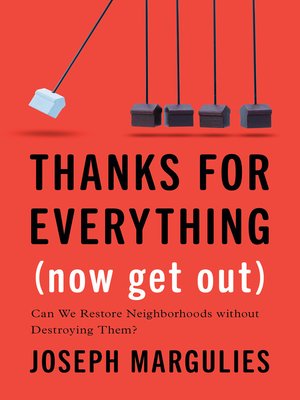Thanks for Everything (Now Get Out)
ebook ∣ Can We Restore Neighborhoods without Destroying Them?
By Joseph Margulies

Sign up to save your library
With an OverDrive account, you can save your favorite libraries for at-a-glance information about availability. Find out more about OverDrive accounts.
Find this title in Libby, the library reading app by OverDrive.



Search for a digital library with this title
Title found at these libraries:
| Loading... |
When a distressed urban neighborhood gentrifies, all the ratios change: poor to rich; Black and Brown to white; unskilled to professional; vulnerable to secure. Vacant lots and toxic dumps become condos and parks. Upscale restaurants open and pawn shops close. But the low-income residents who held on when the neighborhood was at its worst, who worked so hard to make it better, are gradually driven out. For them, the neighborhood hasn't been restored so much as destroyed.
Tracing the history of Olneyville, a neighborhood in Providence, Rhode Island, that has traveled the long arc from urban decay to the cusp of gentrification, Joseph Margulies asks the most important question facing cities today: Can we restore distressed neighborhoods without setting the stage for their destruction? Is failure the inevitable cost of success? Based on years of interviews and on-the-ground observation, Margulies argues that to save Olneyville and thousands of neighborhoods like it, we need to empower low-income residents by giving them ownership and control of neighborhood assets. His model for a new form of neighborhood organization—the "neighborhood trust"—is already gaining traction nationwide and promises to give the poor what they have never had in this country: the power to control their future.
Tracing the history of Olneyville, a neighborhood in Providence, Rhode Island, that has traveled the long arc from urban decay to the cusp of gentrification, Joseph Margulies asks the most important question facing cities today: Can we restore distressed neighborhoods without setting the stage for their destruction? Is failure the inevitable cost of success? Based on years of interviews and on-the-ground observation, Margulies argues that to save Olneyville and thousands of neighborhoods like it, we need to empower low-income residents by giving them ownership and control of neighborhood assets. His model for a new form of neighborhood organization—the "neighborhood trust"—is already gaining traction nationwide and promises to give the poor what they have never had in this country: the power to control their future.






